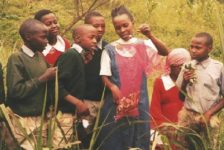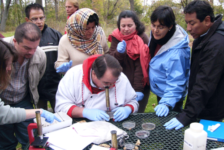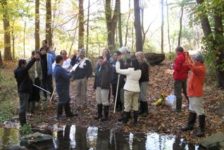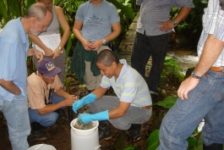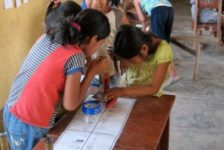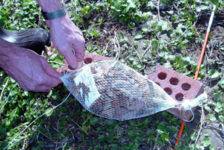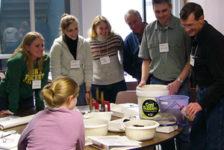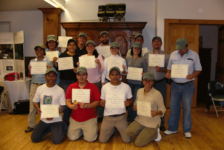In this issue: Kenya Update: Nobel Peace Prize Winner, Stroud Center Partner; Penn State Leaf Pack Project.
“I don’t really know why I care so much. I just have something inside me that tells me that there is a problem, and I have got to do something about it.” — Dr. Wangari Maathai.
Kenya Update: Nobel Peace Prize Winner, Stroud Center Partner
You may have read on the Leaf Pack Network® about a group of Kenyan students who have conducted the Leaf Pack Experiment. For the past couple of years, the Stroud Water Research Center had a partnership with the Green Belt Movement (GBM), in Nairobi.
Professor Wangari Maathai, 2004 Nobel Peace Prize Winner and founder of GBM, took the first Leaf Pack Kit to Kenya in 2002 and her staff ran with it. In 2003, three schools successfully implemented the Leaf Pack Experiment into their science classes!
Last May Wangari and her daughter, Wanjira, visited the Center to discuss our partnership efforts and ways to work with teachers in Kenya. Center scientists are also curious about the types of macroinvertebrates found in Kenyan streams. Stay tuned to the LPN e-Newsletter as we continue our progress with GBM and the students in Kenya.
News and Updates from Stroud Water Research Center
Fall 2004 was a busy time for the Stroud Center’s educators. Leaf Pack workshops were presented at the following locations:
- October 2004: New Jersey Science Teacher Convention, New Brunswick, NJ
- November 2004: Clearpool Education Center, Carmel, NY; Lake George Waterkeeper, Bolton Landing, NY
- December 2004: National Science Teacher Association Regional Convention, Richmond, VA
We also send best wishes to Jim McGonigle, whom many of you have met at his workshops. Jim was Director of Education at the Center from 1999 until last October, when he accepted a position at the University of Pennsylvania. We thank him for his countless contributions to the Center and we wish him the best in his new endeavors.
Penn State Leaf Pack Project
Contributed by Gina Ermilio and the entire Earth Science class at Penn State University Delaware County.
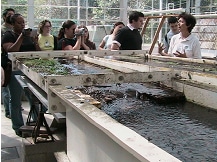
In October 2004, students from Dr. Laura Guertin’s Earth Science class at Penn State Delaware County participated in a Leaf Pack experiment to test the water quality of a a stream running through their campus. Before they began, the entire class visited Stroud Water Research Center, where the students toured the facility and learned the importance offreshwater research.
The on-campus experiment focused on two test sites in White Clay Creek, which runs beside the Stroud Center. Three leaf packs were placed in the stream closest to the student population, and three others were placed further downstream in the rural area of campus. Our hypothesis was that the rural section of the stream would be healthier because of all the student activity in the area closer to the building.
For one month, the students monitored the water quality data and weather for each site and compared the results. At the end of the month, they removed all six leaf packs and analyzed them for macroinvertebrates. Because the students had spent time in their classroom learning macroinvertebrate identification, they were able to quickly identify six different macro types from their leaf packs. The results were clear: the stream was healthier in the rural part of campus.
The students plan to share their findings with another group of students in Port of Spain, Trinidad, to find similarities and differences among stream health. They created several DVDs to send with information for each step of the process. Along with tracking weather for Pennsylvania, the students also monitored weather for Trinidad, in order to get a better understanding of their results. In the end, a website was set up with photos and email contacts for collaboration on the project between the two groups.



